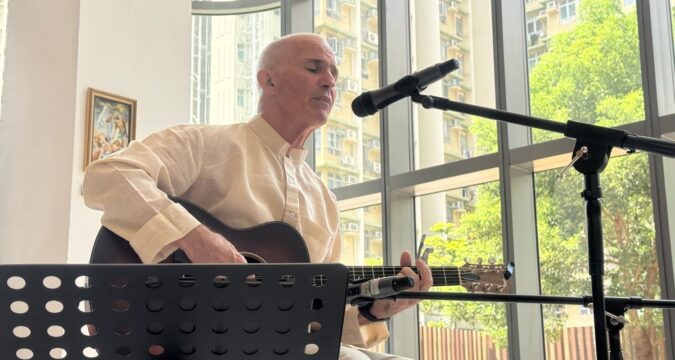
HONG KONG (SE): Benedictine Father Cyprian Consiglio, a Camaldolese monk, musician and author, was invited by the World Community for Christian Meditation to Hong Kong for a series of music and prayer gatherings titled, “Streams of Living Water” in mid-October.
After performing in Penang, Malaysia, he was invited to sing, from October 9 to 19, at St. Francis University, St. Joseph’s Church, Fanling, Kowloon Union Church, St. Andrew’s Church and Rosary Church. The last music prayer event will be held at Our Lady of Mount Carmel Church, Wanchai at 3:00pm on October 19. His songs, reflective and soothing, are popular on Spotify and YouTube.
Based in Rome, Father Consiglio is the secretary general of Monastic Interreligious Dialogue under the Benedictine Confederation.
The concert’s theme compared Jesus to a river of living water flowing from the hearts od the faithful, inspired by the biblical verses in which Jesus declares: “the one who believes in me … from that one’s innermost being will flow rivers of living water” [John 7:37-38].
In the two-hour session on October 9 at St. Francis University, the priest sang 20 liturgical and scriptural songs he composed himself including the theme song, “Streams of Living Water”, “There is a Light”, affirming that no darkness can overcome the light; as well as “Well Done, Faithful Servant” a song written for his father’s funeral.
Music carries its own language and deepens with prayer and meditation
Father Consiglio
The board member of the World Meditation Foundation of the United Nations also performed the song “Think About Others,” featured at last year’s World Meditation Day. The lyrics, inspired by a poem by the late Palestinian poet, Mahmoud Darwish, encourage listeners to reflect on the struggles of those who lack food, water, shelter, and rest, especially while enjoying their own well-being.
At some parts of the songs, Father Consiglio encouraged participation by inviting everyone to sing together.
At the end of the gathering, Vivian Lee, coordinator of the meditation group in Hong Kong, encouraged those present also to join their activities offered in English and Chinese at different parishes, which can offer them peace amid their busy schedules.
The music gathering was attended by over 100 people, including religious people, students and university provost, Professor Annie Bligh. Afterwards, Guadlupe Father Arturo De La Torre, university chaplain, gave the visiting priest a tour around the campus.
After the music sharing session, Father Consiglio told the Sunday Examiner that the guiding principle for Church music should be “service over performance.” He explained that music inside Mass must serve and support the liturgy, but never overshadow it; yet outside Mass, there is more room for creativity.
The sound of holiness in music is naturally attractive. Musicians need not manipulate emotions but follow the divine voice and allow genuine encounter to resonate
Father Consiglio
“Music carries its own language and deepens with prayer and meditation,” he continued. He shared an inspiring piece of advice from one of his teachers who said that much religious music expresses “the search for God”, while the best sacred music “sounds like having been found by God”, reflecting profound spiritual experience.
However, he advised musicians to avoid thinking about how to make impact on listeners. “The sound of holiness in music is naturally attractive. Musicians need not manipulate emotions but follow the divine voice and allow genuine encounter to resonate,” he said.
The secretary-general of Monastic Interreligious Dialogue, appointed on October 1 last year, also shared about his mission: “promote” and “engage” interreligious dialogue.
He finds it important to raise awareness within the Catholic Church about teachings that encourage dialogue with other religions, especially in light of the 60th anniversary of Nostra Aetate [Declaration on the Relation of the Church to Non-Christian Religions], which advocates for open engagement with non-Christian traditions.
On the other hand, he believes it is also necessary to have direct encounters, particularly with monastic traditions like Buddhism and Hinduism, and contemplative branches of Islam, including Shia and Sufi.
“Dialogue is vital for Catholics; it fosters peace and reflects Christ’s presence,” he said, adding that these interactions can introduce fresh perspectives and spiritual practices, enriching faith.



